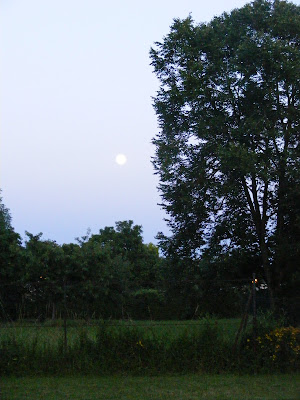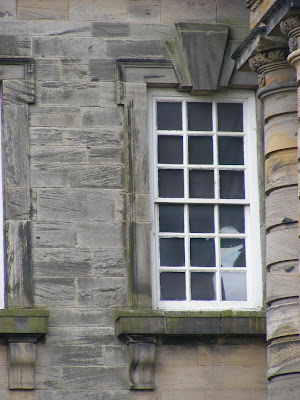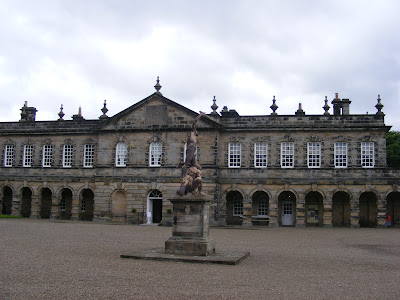In this, Veblen writes that it is in ‘the higher stages of the barbarian culture’ that one finds the best developed tradition of the leisure class, characterised by rigorously observed distinctions between and within the various classes. He gives examples, eg feudal Europe or Japan amongst others, though his Wikipedia entry says that some of these cultures were fictitious! Let's ignore that for now, because Veblen's theory is nonetheless interesting and, I think, quite applicable.
Veblen says the most striking economic issue in the barbarian class distinctions
is about what constitutes 'proper' employment. For example, the upper classes
are barred from ‘industrial’ occupations
and are reserved for those few occupations 'to which a degree of honor
attaches': government, warfare,
religious observances and sports, but primarily the first three.
“Manual labor, industry, whatever has to do directly with the everyday work of getting a livelihood, is the exclusive occupation of the inferior class. This inferior class includes slaves and other dependents, and ordinarily also all the women. If there are several grades of aristocracy, the women of high rank are commonly exempt from industrial employment, or at least from the more vulgar kinds of manual labor.”
In talking about Nordic and North American hunting tribes, in which the
leisure class wasn't yet entirely applicable, the distinction is made between occupations
of men and those of women and 'this distinction is of an invidious
character'. In these tribes, the women
are by prescriptive custom held to the employments out of which the industrial occupations
later develop. Men are exempt from these 'vulgar employments' and are
reserved for war, hunting, sports and devout observances. Although the men's
work may contribute as much to the food supply and thus be considered
'productive', the hunter does not see himself at all connected with women's
uneventful drudgery. Rather his work is
admirable and full of adventurous exploit. Thus, the first class distinction was to give
women a lower status.
Veblen says for a leisure class to emerge there must be three things in
place:
a) the community must be of a predatory habit of life, eg war and/or the hunting of large game; the men in the undeveloped leisure class must be habituated to inflicting injury by force and strategy;
b) subsistence for the whole of the society must be sufficiently obtainable that a considerable portion of the community can be exempt from steady labor; and
c) there is a growing discrimination between what is considered worthy or unworthy employments.
a) the community must be of a predatory habit of life, eg war and/or the hunting of large game; the men in the undeveloped leisure class must be habituated to inflicting injury by force and strategy;
b) subsistence for the whole of the society must be sufficiently obtainable that a considerable portion of the community can be exempt from steady labor; and
c) there is a growing discrimination between what is considered worthy or unworthy employments.
Unworthy employment includes all those necessary everyday things
involving no element of exploit. When reading this the phrases ‘women’s
work’ and 'blue collar vs white collar' jobs came to mind. Value labels are attached not just to the
work, but even to the tools of labour.
It is reserved for a higher class to even handle the accoutrements of
war or worship, but the ‘brute materials’ he calls ‘inert’ are left for the
women to make useful.
“Such being the barbarian man's work, in its best development and widest divergence from women's work, any effort that does not involve an assertion of prowess comes be unworthy of the man. As the tradition gains consistency, the common sense of the community makes it into a canon of conduct; so that no employment and no acquisition is morally possible to the self-respecting man at this cultural stage, except as proceeds on the basis of prowess - force or fraud. When the predatory habit of life has been settled...by long habituation, it becomes the able-bodied man's accredited office in the social economy to kill, to destroy such competitors in the struggle for existence as attempt to resist or elude him...”
Again, Veblen emphasises that the distinction between exploit and drudgery is an invidous one. Employments without honourable status, particularly any that imply
subservience or submission are unworthy, debasing, ignoble. The concepts of
dignity and worth are not just applied to employments, but also to people and
to their conduct (Where would we be
without books on etiquette? Was your Grandmother as keen as mine to be
perceived as 'respectable'?) and as a consequence, we have the development of
classes and class distinctions. This has
knock-on effects, in that where (emphasis is mine):
"An invidious comparison of persons is habitually made, visible success becomes an end sought for its own utility as a basis of esteem. Esteem is gainted and dispraise (criticism) is avoided by putting one's efficiency in evidence. The result is...and emulative demonstration...Tangible evidences of prowess (trophies) find a place in men's habits of thought as an essential feature of the paraphernalia of life. Booty, trophies of the chase or raid come to be prized as evidence of pre-eminent force. Aggression becomes the accredited form of action, and booty serves as prima facie evidence of successful aggretion. As accepted at this cultural stage, the accredited, worthy form of self-assertion is contest; and useful articles or services obtained by seizure or compulsion, serve as a conventional evidence of successful contest.
Therefore, obtaining goods by methods other than seizure becomes less worthy. Performance of productive work or employment in personal service becomes odious. Labor becomes irksome because it is now undignified and dishonorable.
Veblen goes on something of a rant about 'honorable' :
“...primarily honorable is the assertion of the strong hand....The predilection shown in heraldic devices for the more rapacious beasts and birds of prey goes to enforce the same view. Under this common-sense barbarian appreciation of worth or honor, the taking of life — the killing of formidable competitors, whether brute or human — is honorable in the highest degree. And this high office of slaughter, as an expression of the slayer’s prepotence, casts a glamour of worth over every act of slaughter and over all the tools and accessories of the act. “
So, these three posts (Savage Culture, Veblen's Definitions and Barbarian Culture) cover the concepts discussed in his introduction, ideas that underpin the other chapters which follow. In the next chapter, he discusses Pecuniary Emulation.







































